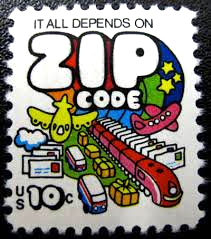
Data companies and retailers use the zip to accumulate an amazing amount of personal data you thought only you and your hairdresser knew for sure. Such as your body type, your marital status, your health habits, educational level, how many children you have (including if you are expecting) and their age groups, if your home is for sale, your political preferences, if you are getting divorced, etc., etc., etc.
Acxiom, one of the country’s biggest data brokerages, for instance, reports that it has information generated by zip codes on 190 million Americans. The company’s largest competitors, Datalogix and CoreLogic, have similar databases.
These companies can tell, by combining the swipe of your credit card and your zip code, whether you are the Jane Doe who lives in Denver, or the Jane Doe who resides in Cascade, Montana. They can use the information to predict what you are likely to buy next. It’s called predictive analysis or predictive modeling. For instance, if you’re buying maternity clothes, the merchant knows that baby supplies are next. He can start bombarding you with specifically directed ads.
Those who use the data say it’s good business. It helps the merchant to target advertising to certain customers, saving advertising money and giving better service to those who buy. On the other side of the scales are those who argue that the trade-off in indiscriminate use of personal information is unacceptable.
Once the information gets into their databases, the users may swap among themselves so that you go from the merchant to the insurance salesman to the financial institutions, hotel chains, auto manufacturers and even Facebook. “Some of these data brokers know us better than we know ourselves,” said Pam Dixon, executive director of World Privacy Forum.
What makes it easier for retailers is of major concern to folks such as Dixon whose primary objective is to protect your privacy. They are concerned not only that your personal information is up for grabs, but at the prospect of what could happen if it gets into the wrong hands.
A growing number of merchants, including the grocery store and even the gas station, are asking for the customer’s zip code. You probably don’t have to give it. In Massachusetts, the Supreme Court ruled that zip codes are personal information that purchasers don’t have to share. California has a similar law. It’s possible to ask that the data brokers not share your information, but few people know that or act on the knowledge.
The Federal Trade Commission has become involved and is asking the nine major data brokers to explain how they collect, store and share the information they gather. Most of the companies report that they don’t reveal information such as Social Security or drivers license numbers. But the oversight agency wonders what would happen if the databases were hacked, opening a huge can of identity theft concerns.
With technology finding new and interesting ways to learn everything there is to know about everyone in every context, striking a balance between information and privacy is likely to get more attention.



